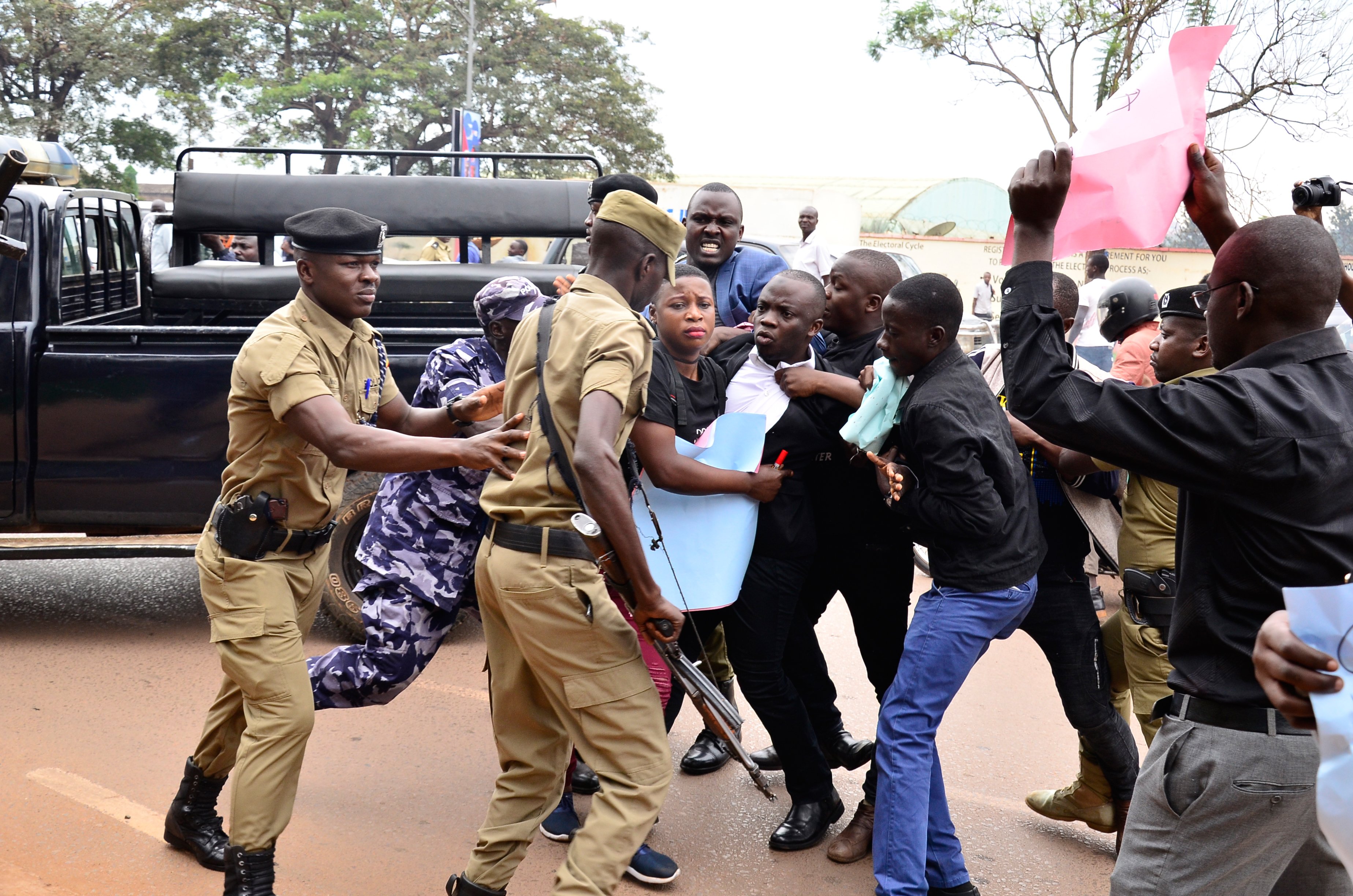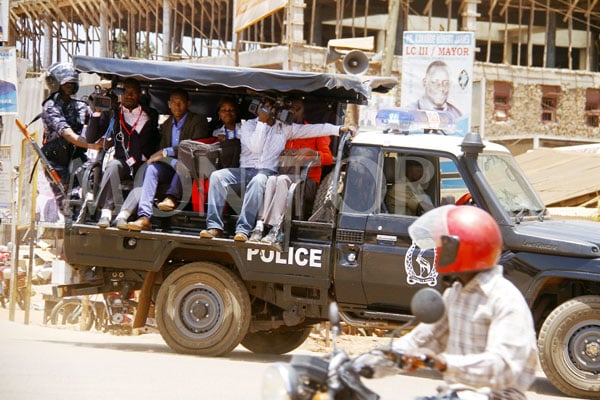Govt has a duty to protect journalists, media industry

Police arrest journalists who were marching to the Force’s headquarters in Naguru, Kampala, to petition the IGP in November 2019.PHOTO/FILE/ABUBAKER LUBOWA
What you need to know:
- On Wednesday, a media advocacy documentary and pictorial exhibition was launched in Kampala to highlight the progress and challenges of journalists in Uganda over the last five years.
- Commissioner Crispin Kaheru of the Uganda Human Rights Commission gave a speech. Below is an abridged version.
Responsibly free, independent and vibrant media is indispensable in any society that claims to be a democracy. The freedom of press and other media is, therefore, part of the wider fundamental freedom of speech and expression which underpins all other human rights and freedoms. The media, globally, plays a critical role in the functioning of democracy. The media and journalists specifically are both enablers of the right to freedom of speech as well as facilitators of the right to information. Both these liberties enhance citizens’ participation in governance. With my extensive background in electoral work, I very well appreciate the importance of both freedom of speech and the right to information.
Freedom of speech and expression means that everyone has the right to: 1) disseminate information and ideas; 2) to seek information and ideas; 3) to receive information and ideas and 4) to impact information and ideas.
In exercising our freedom to disseminate, seek, receive and utilise information, we should be able to do it responsibly. At each of the above four stop-points that I have highlighted, we should employ what the Rotarians popularly refer to as a ‘four (4) way test’. We should ask ourselves: Is it the truth? Is it fair to all concerned? Will it build goodwill and better friendships? and will it be beneficial to all concerned? If the answers to all the above are in the affirmative, then there is certainly no reason why you shouldn’t exercise your freedom and right.
The genesis of the media in Uganda dates back in 1900, when the first newsletter was published by the Church Missionary Society. The broadcasting media came into existence in 1954 when Radio Uganda was started.
The media, however, suffered extensively during the political turmoil that lasted about 20 years, between 1966 and 1986. Thereafter, Uganda witnessed a media growth, with the first private FM radio station (Radio Sanyu) going on air in 1993. Since then, there has been a proliferation of media houses including televisions, radio stations, print media, and social media. The media industry has therefore grown from one state radio and television, to over 300 registered radio stations.
It is significant to point out that of the about 300 registered radio stations, 292 FM stations are privately owned. Uganda also has 33 operational TV stations, including eight (8) pay TV service providers and 28 free-to-air service providers.
Distinguished participants, the numbers above partly demonstrate the breadth of the media landscape in Uganda – at least numerically, for that matter.
Therefore, while we celebrate media growth, we should remain alive to the reality of threats and intimidation that sometimes times adulterate the working environment of media practitioners. We have seen unfortunate cases where journalists have been subjected to cruel, inhuman and degrading treatment through arbitrary arrests, assault, detention and confiscation of their equipment.
There have also been incidents where some security personnel have confiscated gadgets and deleted information from journalists’ cameras and recorders. There have also been reports of some Opposition politicians being denied space or airtime to share their views in some media houses – especially during election seasons. These incidents have a chilling effect on the journalism profession. To say the least, they reflect a degree of impunity, are regrettable and must be condemned at every opportunity.
Access to reliable information and quality media is important at all times. However, it becomes more vital in times of crisis, yet journalists continue to be denied access to information and sources of information. In other incidents, they have been denied access to particular locations or premises where they could gather news stories. Laws such as the Access to Information Act, the Press and Journalist Act, have their own pros and limitations to the space and scope of practicing journalism in Uganda. This is despite the Constitutional guarantees as reflected in Article 29 of the Constitution of Uganda.
In the same breath, let me also highlight that; information disorder in our region is reaching new heights. This is fuelled by rising levels of distrust vis-à-vis the media.
The media continues to contend with challenges of lack of professionalism, inadequate training, unethical conduct, coupled with poor working conditions and inadequate remuneration for journalists. These challenges negatively impact on the quality of journalism not just in Uganda but in many other parts of the world. With these limitations, comes the risk of self-censorship or low-quality reporting.
There is also a worsening trend of corruption among journalists. Given the uneven working conditions of journalists across the media, there has been an inevitable increase in corruption. The more affluent and well-established media houses provide better working condition and therefore may not be affected by this growing trend. However, journalists from less established media houses tend to charge organisations in order to gain media coverage.
From the onset, social media presented an opportunity to share and exchange information in real time. However, it has also been turned into a source of misinformation, disinformation and fake news, with many subscribers to the various social media platforms receiving and sharing news without first verifying the authenticity of the content. Fake news and privacy issues existed in the past. However, the emergence of social media has rudely amplified them.
Given the context and challenges, I believe that the media, if united, can play an important role to protect itself and hold itself to account. First and foremost, by upholding a set of professional standards and secondly, through self-regulation. Self-regulation allows the media to maintain dialogue with the public while at the same time, protecting the independence of journalists. This is crucial for democracy. We also need to invest more in media education and media and information literacy, across all generations. Media and information literacy may well be resource-intensive, but in the long-run, it will certainly be an effective way of building resilient societies.
The past five years have been quite busy with 2020 and 2021 being abuzz with electoral activity. As Uganda Human Rights Commission, we are anxious to hear the media perspective with regard to the rights of journalists in the last five years. This explains our interest in the media advocacy documentary and pictorial exhibition which we are here to launch today.
We need to continuously re-commit to addressing gender discrimination, hate speech and digital violence against journalists, especially the female journalists. Physical violence, cyber attacks, discrimination and hatred often accelerate during conflict situations and disproportionally affect women journalists and journalists with intersecting identities, resulting in the silencing of their voices, their reporting and their perspectives.
I want to pay tribute to all journalists who have lost their lives – and more especially in their line of work. In the same spirit, I would like to pay tribute to journalists who continue to work under difficult circumstances to bring to us accurate and balanced news stories. Their safety raises grave concerns as cases of injury, harassment and intimidation continue to be documented.
I have said this many times before and I want to reiterate it once more, here: media professionals must be considered and protected as civilians; they must never be targets. Government as a primary duty bearer should re-commit to protecting journalists and the media industry in general. I therefore call upon all the ministries, departments and agencies, media houses, CSOs and journalists to re-commit themselves, to preventing violation of media freedoms and rights of journalists at all levels.
Opinion
In exercising our freedom to disseminate, seek, receive and utilise information, we should be able to do it responsibly. At each of the above four stop-points that I have highlighted, we should employ what the Rotarians popularly refer to as a ‘four (4) way test’.
We should ask ourselves: Is it the truth? Is it fair to all concerned? Will it build goodwill and better friendships? and will it be beneficial to all concerned? If the answers to all the above are in the affirmative, then there is certainly no reason why you shouldn’t exercise your freedom and right,’’ Mr Crispin Kaheru.




